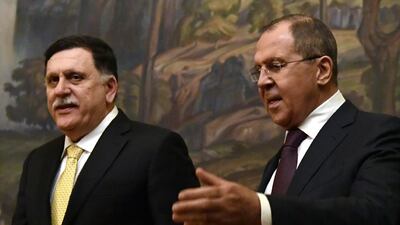Russia on Thursday asserted its growing ambitions in the Middle East by holding talks in Moscow with Fayez Al Sarraj, head of Libya’s UN-backed Government of National Accord.
Less important than the substance of the negotiations was Russia’s decision to hold them, underlining its increasing engagement in Libya in tandem with its key role in the Syrian conflict.
Before the talks, Dmitry Peskov, press secretary for president Vladimir Putin, said their aim was to stabilise Libya, a country he said has been in turmoil ever since its 2011 revolution which toppled former leader Muammar Qaddafi.
In that revolution, bombing by a Nato-led coalition gave victory to the rebels, but Mr Peskov told Russian news agency Tass this amounted to a “barbaric intervention”, toppling Qaddafi but leaving chaos in its wake.
“Russia is interested in Libya finally becoming a working state after this barbaric intervention that was conducted from outside, that led to catastrophic consequences,” Mr Peskov said. “That is why we are interested in the swift development of a durable power in Libya.”
Russia’s Libya policy continues to be at odds with the United States and the European Union. While the latter has recognised Mr Al Sarraj’s administration as Libya’s legitimate government, Russia is among the states, which also include Egypt, that recognise the authority of a rival body – the elected House of Representatives parliament. The House of Representatives, which is based in the eastern town of Tobruk, has its own interim government independent of Mr Al Sarraj’s Government of National Accord.
Russia is not the only country trying to bring Libya’s rival governments together. German chancellor Angela Merkel arrived in Cairo on Thursday for two days of talks on the subject just days after British foreign secretary Boris Johnson made a similar trip. On the agenda for both visits was support for an Egyptian initiative launched last month to convene power-sharing discussions between Libya’s key players.
In January, Moscow invited the House of Representatives’ army commander, Field Marshall Khalifa Haftar, aboard its aircraft carrier the Admiral Kuznetsov for talks on military cooperation. Field Marshall Haftar opposes the Government of National Accord, and has repeatedly announced his intention to liberate Tripoli – where the Government of National Accord is based – from groups he describes as terrorists.
The Field Marshall has become a key figure in Libya’s political mosaic after capturing key oil ports in September, giving the House of Representatives control of the so-called Oil Crescent, home to the bulk of the country’s hydro-carbon wealth.
Mohammed Dayri, foreign minister in the House of Representatives’ interim government, on Thursday told Russian state television station Russia Today that he welcomed Moscow’s interest in Libya, calling on outside powers to support Field Marshall Haftar.
“Russia, Egypt and even for that matter France are states who would like to curb terrorism, but [by allying] with adequate people in Libya like [Field Marshall] Haftar and the Libyan National Army.”
Last week Russia engaged in Libya on a second front, with state-owned oil giant Rosneft signing a cooperation agreement with Libya’s National Oil Corporation. The NOC has declared itself answerable to both the Government of National Accord and the House of Representatives.
Rosneft will become involved in both production and exploration, as Libya seeks to bump up production past two million barrels a day by 2020.
The military initiative reinforced Moscow’s support for the House of Representatives, rather than the Government of National Accord. This support was underlined last year when Russia printed banknotes for the parliament’s eastern central bank, even as the separate Tripoli central bank printed its own currency in Britain.
Mr Putin did not meet Mr Al Sarraj on Thursday, a move that appears in accord with international protocol whereby the Russian president, as head-of-state, would normally only meet with another head-of-state. As Russia recognises the House of Representatives as Libya’s legitimate administration, it would view Mr Putin’s Libyan counterpart as the elected parliament’s president, Agila Saleh.
Instead, Mr Al Sarraj met with Russian foreign minister Sergey Lavrov, with discussions focusing on whether it is possible to create a truly national Libyan government.
Mr Al Sarraj’s government is in an increasingly precarious position. Rejected by the House of Representatives, it is also contesting the streets of the capital with a third administration vying for control of Libya, the so-called National Salvation Government.
Last week, militias backing Mr Al Sarraj clashed with those supporting the National Salvation Government in battles involving tanks and artillery in Tripoli. A precarious ceasefire has since taken hold, but the militias have begun fortifying a de facto front line with earthen barriers and shipping containers blocking roads in the capital.
On one thing Moscow and outside powers agree – that Libya’s civil war should end, all the more so since the current chaos allows ISIL and other extremist groups to flourish.
Less certain is whether Russia and Western powers will agree on a common way forward, or whether, as in Syria, they will support different sides.
foreign.desk@thenational.ae

